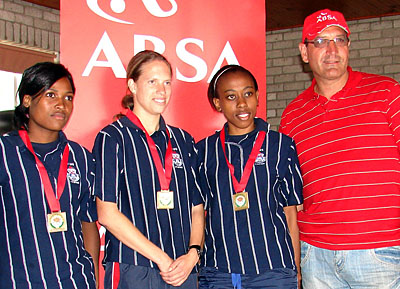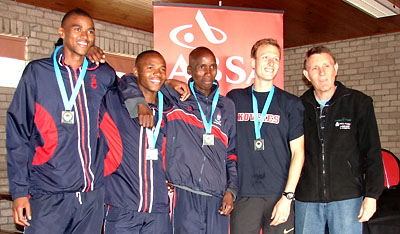 |
| In the Kovsie women’s cross-country team were, from the left: Thandi Malindi, Maryna Swanepoel and Lettie Dhlamini. |
 |
| In the Kovsie men cross-country team, who participated in the recent USSA Cross-Country Championships in Port Elizabeth, are from the left: Ratlale Mokone, Khothatso Mokone, Boy Soke and Johan Cronjé. |
The University of the Free State (UFS) entered both a men’s and a women’s team in the recent USSA Cross-Country Championships that took place at the Nelson Mandela Metropolitan University in Port Elizabeth.
According to Ms Sarina Cronjé from KovieSport at the UFS, both teams did extremely well. Kovsies men came second in the men’s 4 km race as well as the 4x5 km road relay and our women finished third in the 8 km race.
Congratulations to Boy Soke (2nd), Johan Cronjé (3rd), Ratlale Kokone (7th) and Khothatso Mokone (14th) who came second in the team competition of the 4 km race with 26 penalty points against the 22 penalty points of the Pukke, who won the team competition. Our men’s B-team with Windy Jonas (17), Antonie Peens (20), Gerrit Viljoen (31) and Laurens van der Merwe (33) ended in sixth place in the 4 km team competition.
Our women finished third in the 8 km team competition with 31 penalty points. Thandi Malindi (9th), Maryna Swanepoel (10th) and Lettie Dhlamini (12th) were the team members.
“To each and every athlete a word of appreciation for the manner in which you ran, as well as the guts you have shown on a difficult course in very windy conditions,” said Ms Cronjé.